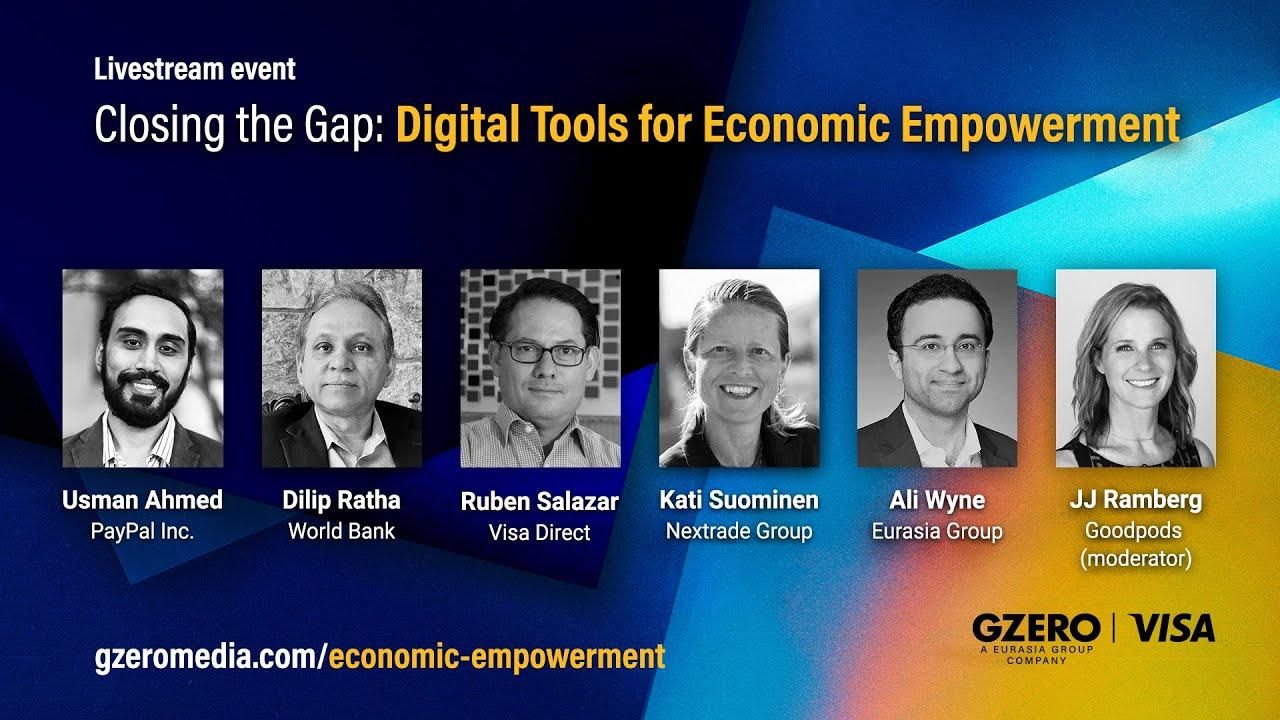Closing the Gap
Lowering costs of poverty with digital & economic access

Lowering Costs of Poverty With Digital & Economic Access | Economic Empowerment | GZERO Media

By the end of the decade, 70% of all new value in the global economy will come from digitally enabled businesses. The pandemic accelerated a push toward digitalization, especially in developing nations, yet nearly 4 billion people are still offline, and 1.4 billion don't have a bank account.
Expanding access to digital tools for individuals and small businesses is a no-brainer, but easier said than done. So, what can we do to expand digital trade further, come up with fairer and safer remittances and digital payments, and push to include everyone in tomorrow's digital-first economy?
To get some answers, GZERO hosted in partnership with Visa the livestream conversation "Closing the Gap: Digital Tools for Economic Empowerment," moderated by JJ Ramberg, co-founder of Goodpods and former host of MSNBC's Your Business.
Rubén Salazar, global head of Visa Direct, underscored how digital decency has become more acute in the post-pandemic world, yet many systems — for instance, payroll — remain analog. He also explained why unbanked people live in a vicious cycle of hardship because they can only operate in cash and lamented why cash-only networks make remittance fees so high — even as the UN goal wants to set a global 3% limit by 2030.
Ali Wyne, senior analyst for global macro-geopolitics at Eurasia Group, discussed how the discrepancy of having 1.7 billion people now cut off from the direction of travel of the global economy creates both an urgent imperative to go digital and an opportunity to narrow the gap. The likely geopolitical fallout from all of this happening after COVID and the food and energy crisis made worse by the war in Ukraine? Waves of political unrest that'll topple governments.
Dilip Ratha, head of KNOMAD and lead economist at the World Bank, shared his personal story of sending remittances to his family when he was still a student in the US. That's how he learned why it's so hard for migrants to send money back home — a lifeline for their families and remittance-dependent economies around the world.
Kati Suominen, founder and CEO of digital tech firm Nextrade Group, extolled the virtuous cycle of digital payments and access, which helps everyone the same way lack of it holds up all of us. She singled out paperless customs and logistics tech improvements as a major COVID silver lining for digital trade and offered her take on why — when they go digital — women-led small businesses often perform those led by men.
Usman Ahmed, head of global public affairs and strategic research at PayPal, offered some striking figures on what happens to small businesses when they embrace digital: sales triple by selling online, and quadruple by selling across borders. Does he see any downsides to a cashless economy? Nope, especially when it comes to the digital services created around it, but Ahmed recognized that unbanked people face tough challenges to ditch cash.
With the US leading production and China driving new reactor development, Bank of America breaks down the who, what, where, when, and why behind nuclear’s return. Stay ahead of global energy trends with Bank of America Institute.
Chris, an Army veteran, started his Walmart journey over 25 years ago as an hourly associate. Today, he manages a Distribution Center and serves as a mentor, helping others navigate their own paths to success. At Walmart, associates have the opportunity to take advantage of the pathways, perks, and pay that come with the job — with or without a college degree. In fact, more than 75% of Walmart management started as hourly associates. Learn more about how over 130,000 associates were promoted into roles of greater responsibility and higher pay in FY25.
Last week, at the Munich Security Conference, a group of global technology providers, including Microsoft, announced the Trusted Tech Alliance — committed to shared, verifiable principles for trusted, transparent, and resilient technology across borders. At a moment of economic volatility and zero-sum technological competition, countries and customers are demanding greater accountability from technology providers. The Alliance addresses this by bringing together companies from across Africa, Asia, Europe, and North America around shared commitments: transparent governance, secure development practices, supply chain oversight, open digital ecosystem, and respect for the rule of law — ensuring the benefits of emerging technologies strengthen public trust while driving job creation and economic growth. Explore the Trusted Tech Alliance here.